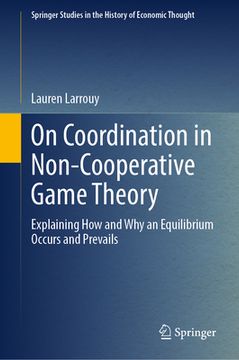Compartir
On Coordination in Non-Cooperative Game Theory: Explaining How and Why an Equilibrium Occurs and Prevails (en Inglés)
Lauren Larrouy
(Autor)
·
Springer
· Tapa Dura
On Coordination in Non-Cooperative Game Theory: Explaining How and Why an Equilibrium Occurs and Prevails (en Inglés) - Larrouy, Lauren
S/ 585,11
S/ 1.170,23
Ahorras: S/ 585,11
Elige la lista en la que quieres agregar tu producto o crea una nueva lista
✓ Producto agregado correctamente a la lista de deseos.
Ir a Mis Listas
Origen: Estados Unidos
(Costos de importación incluídos en el precio)
Se enviará desde nuestra bodega entre el
Martes 02 de Julio y el
Martes 16 de Julio.
Lo recibirás en cualquier lugar de Perú entre 2 y 5 días hábiles luego del envío.
Reseña del libro "On Coordination in Non-Cooperative Game Theory: Explaining How and Why an Equilibrium Occurs and Prevails (en Inglés)"
By offering a critical assessment of the evolution of standard game theory, this book argues for a shift in the ontology and methodology of game theory for appraising games, one based on understanding the players' strategic reasoning process. Analyzing the history of economic thought, the book highlights the methodological issues faced by standard game theory in its treatment of strategic reasoning and the consequence it has on the status of players' beliefs. It also highlights how the two original contributions of T. C. Schelling and M. Bacharach can be applied to these issues. Furthermore, the book assesses the intersubjective dimension in games by applying the cognitive sciences and by integrating simulation theory into game theory. Consequently, this book offers an interdisciplinary approach for reassessing the nature of the intersubjectivity involved in strategic reasoning. It shows that the analysis of games should involve the study and identification of the reasoning process that leads the players to a specific outcome, i.e., to a specific solution. A game should not be understood (as is done in standard game theory) as a mathematical representation of an individual choice at equilibrium. This requires investigating the players' capacity for coordination. Understanding the process of coordination allows us to understand strategic reasoning and ultimately to provide new answers to the indeterminacy problem, one of the central hurdles in game theory, and one that underscores its normative difficulties.
- 0% (0)
- 0% (0)
- 0% (0)
- 0% (0)
- 0% (0)
Todos los libros de nuestro catálogo son Originales.
El libro está escrito en Inglés.
La encuadernación de esta edición es Tapa Dura.
✓ Producto agregado correctamente al carro, Ir a Pagar.

